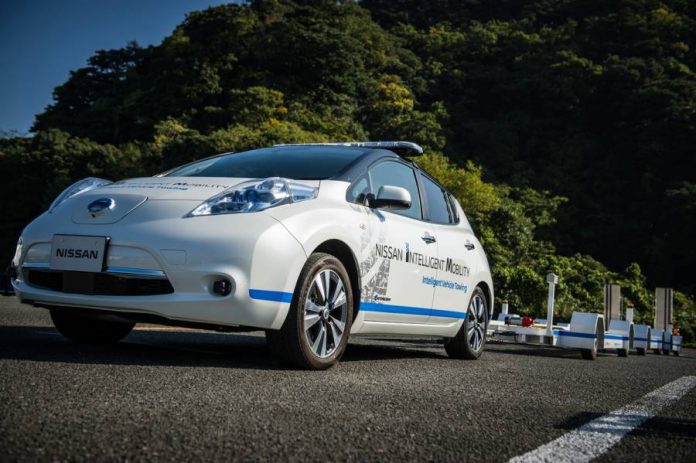
Today, Nissan Motor Corporation announced via their official blog the introduction of the Intelligent Vehicle Towing (IVT) system at its plant in Oppama, Yokohama, Japan. This project looks to increase transportation efficiency and to test the reliability of EVs.
The company will use a modified Nissan Leading Environmentally-friendly Affordable Family car, better known as a LEAF model for this project. The LEAF is Nissan’s signature non-fuel compact.
The modified LEAFs will show the industry how powerful EVs can be.
Nissan is currently working towards the integration of society with these types of technologies under its Intelligent Mobility vision, which is similar to that of companies like Tesla.
Intelligent Vehicle Towing video
Why is Nissan LEAF special?
The modified LEAF cars carry rows of new vehicles through the plant between designated loading and unloading points.
They do not require any aid from the surrounding infrastructure to know where to go which makes them more autonomous than other conventional transport systems used in factories.
For example, most industrial installations for self-driving vehicles use rails or magnetic tape to guide vehicles towards their destination, but the Nissan LEAF relies only on itself, using a combination of camera systems and laser scanners to move around the plant.
#Nissan has created a driverless towing system for use at its production facilities. Find out more: https://t.co/mF9Ici6dPI pic.twitter.com/vS5rEQu5rZ
— Nissan Motor (@NissanMotor) December 5, 2016
The car can detect curbs, lane markings, and obstacles on the road all by itself, later cross-referencing this information with map data and generating its path automatically towards the drop point.
The car can also stop itself entirely if needed, and resume driving once the obstacle disappears from its path.
Its programming keeps it driving under the factory’s speed limits at all times. When two LEAF models meet at an intersection, their algorithm can determine which one has the right-of-way.

Nissan is not a newcomer in the self-driving car industry
The Oppama plant automated towing operation has been in place since late 2015, generating significant benefits for the production line because it has eliminated the need for human drivers to transport new cars to the shipping points.
The data acquired through more than a thousand operations keeps the system updating itself continuously, avoiding accidents and paving the way for other fully-automated industrial projects.
The IVT system is not the first autonomous driving project developed by Nissan. Last August, the company launched the ProPILOT technology, a self-driving function for cars on the highway.
Source: Nissan










